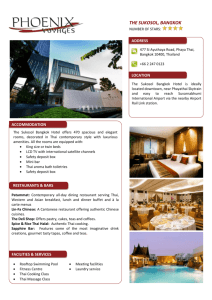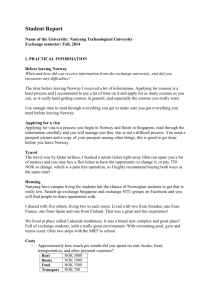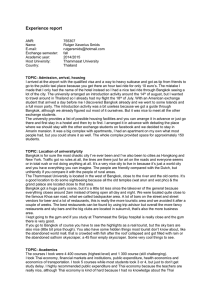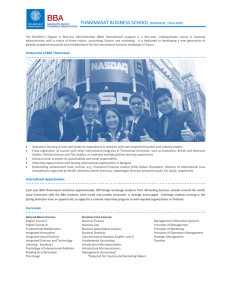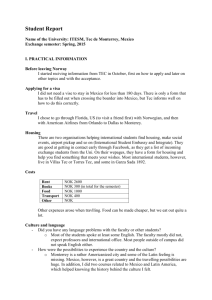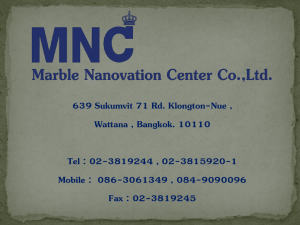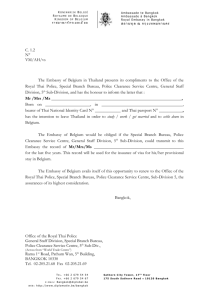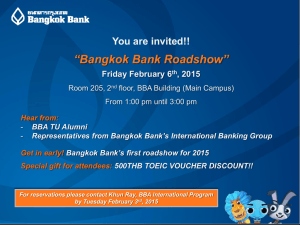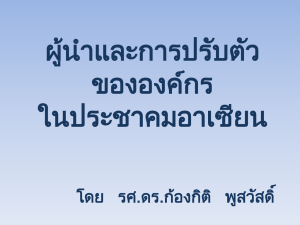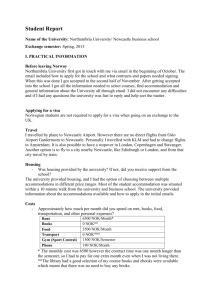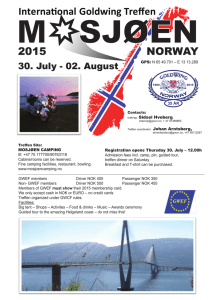Thammasat University - Fall 2013
advertisement
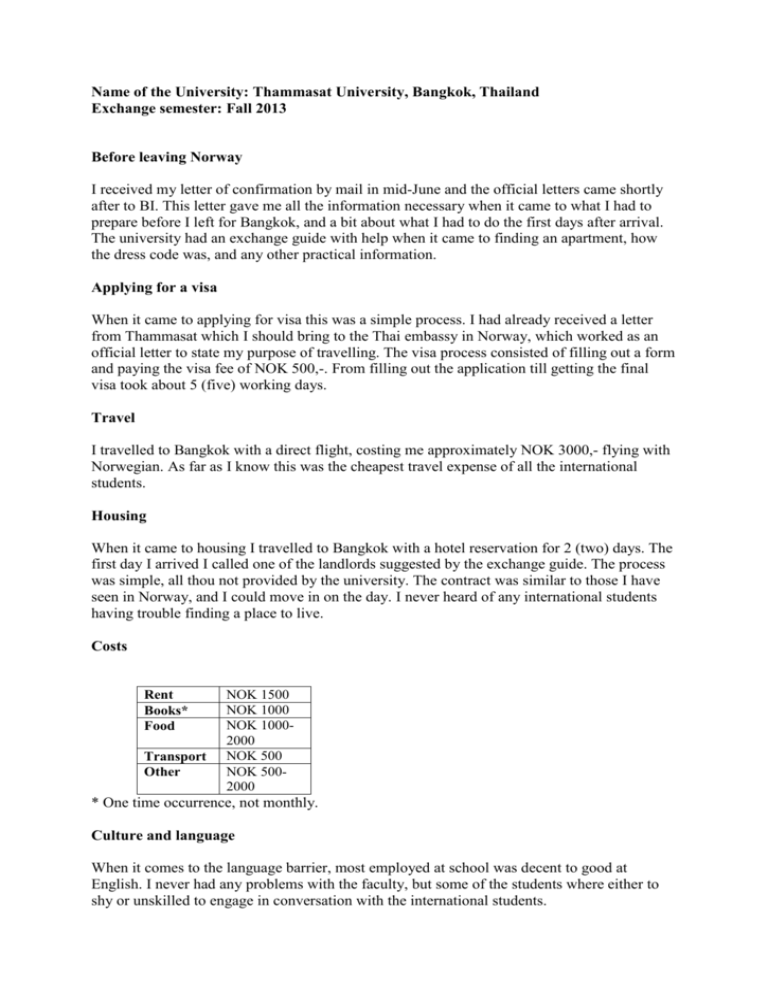
Name of the University: Thammasat University, Bangkok, Thailand Exchange semester: Fall 2013 Before leaving Norway I received my letter of confirmation by mail in mid-June and the official letters came shortly after to BI. This letter gave me all the information necessary when it came to what I had to prepare before I left for Bangkok, and a bit about what I had to do the first days after arrival. The university had an exchange guide with help when it came to finding an apartment, how the dress code was, and any other practical information. Applying for a visa When it came to applying for visa this was a simple process. I had already received a letter from Thammasat which I should bring to the Thai embassy in Norway, which worked as an official letter to state my purpose of travelling. The visa process consisted of filling out a form and paying the visa fee of NOK 500,-. From filling out the application till getting the final visa took about 5 (five) working days. Travel I travelled to Bangkok with a direct flight, costing me approximately NOK 3000,- flying with Norwegian. As far as I know this was the cheapest travel expense of all the international students. Housing When it came to housing I travelled to Bangkok with a hotel reservation for 2 (two) days. The first day I arrived I called one of the landlords suggested by the exchange guide. The process was simple, all thou not provided by the university. The contract was similar to those I have seen in Norway, and I could move in on the day. I never heard of any international students having trouble finding a place to live. Costs Rent Books* Food Transport Other NOK 1500 NOK 1000 NOK 10002000 NOK 500 NOK 5002000 * One time occurrence, not monthly. Culture and language When it comes to the language barrier, most employed at school was decent to good at English. I never had any problems with the faculty, but some of the students where either to shy or unskilled to engage in conversation with the international students. When it came to the cultural aspect of my exchange I had the possibility to experience the culture and country of both Thailand and the surrounding countries. Travel expenses in southeast Asia is cheap and convenient due to the large scale of backpackers travelling around. II. ABOUT THE SCHOOL Please describe: Thammasat University Campus Thapra Chan is located in the older part of Bangkok. Right next to the Royal Palace and Sanam Luang Park. It is 5 (five) minutes of walking from Campus to Khao San Road. On campus one can find several faculties, office buildings, a soccer field and cafeterias with view of Chao Phraya River. With its utilized space of approximately 103.000 square meters, it’s a decent size campus. Most mentionable, the school is known for its education when it comes to political science and economy, but it also offers a faculty of law and some other programs. When it comes to the study structure of the university they are generally using class rooms and class participation is both mandatory and evaluated as part of your final grade. They operate with different forms of evaluations ranging from class presentations, term papers, midterms and finals. Course registration Course registration on the school was a bit of a hectic period of the introduction week because it is first come first served. Due to the fact that one have to be in contact with the home school and the host university at the same time and get it approved from both it makes it a slow process. So it is important to start early and be quick before the classes’ runs out of seats. One starts register for the classes after the information day, and the add/drop period lasts for two weeks after semester start. Academic calendar Arrival date: First day of the semester: Last day of classes: Examination period: Any special events/holidays: Aug. 05 Aug. 12 Nov. 30 Dec. 05-20 Some celebrations of the Royal Family Other: Arrival Introduction week basically consists of one full day of welcoming and practical information at the school, followed by contact information for a buddy that you can ask to show you around both at school and elsewhere in Bangkok. This week does not really involve any “afterschool” activities, but the internationals all meet every day for socializing over some beers etc. Since the school only uses one day to show you around at school (which in my case was far from enough to learn my way around), it is quite smart to get in contact with as many as possible to help you around. This is simple and fun as everyone starts at the same level knowing few or no one else around. The International Office The International Office have long opening hours, are efficient on answering mails, and keeps you informed of whatever is going on at all time. They will help you with any questions and they are great at helping you with both school related issues and others one might stumble upon. They would organize cultural trips to help the exchange students get together, all of which was for free. Social activities Exchange students and Thai students is often put in project groups together at school in order to get several perspectives on the different topics. This also ensures that exchange students and Thai students have to do things together. When it comes to relationships between the international and the native it is mostly good. There are some cultural differences, and the Thai students do not party as much as the western people do. Some however do, and they tend to hang out with the internationals a lot. All in all I would say the relationship between the international and the Thai was really good. The school have teams for both soccer, volleyball, basketball, Thai boxing etc. These activities are participated by both Thai students and international students. There are cups between different schools with a lot of audience to the matches. III. ACADEMICS In the classroom The teaching style of the classes depended on the class more than anything. In general it was around 30 students in all classes. It would be either lectures similar to those of most classes at BI, or it would be in computer labs practicing different programs like excel or matlab. The level of workload at Thammasat University is similar to that of BI, but one is forced to work with consistency due to quizzes and mid-terms. Course materials In most classes the course materials are a book as main literature, combined with PowerPoint presentations from the professors. Exams When it comes to the exams they were mainly based on the lectures. The lectures were tightly following the course materials thou, so if you missed a lecture it wouldn’t be too hard to catch up again. The courses were evaluated based on: o Final exam (include form: written, oral, home assignment, presentation, etc.) o Mid-term exam o In-class quizzes throughout semester o Small assignments and/or papers o o o o Presentations Group work Class attendance Class participation/debates Library and technology The facilities at the school were all pretty modern. All rooms had air condition, which is of mass importance in Bangkok. The computers around the campus were all pretty new. The furniture’s was all nice and the classroom had all the technology it needed. The library was huge and the system used to administrate the library was top modern. Description of courses Course code & name BA401 Strategic Management IB323 OM313 Quality Management OM311 Management Science FN241 Risk Mng & Insurance Master/ Bachelor Bachelor Exam form Prerequisites None None Elective None Elective Bachelor Based on class presentations 3h written exam and presentation 3h written exam and presentation 3h written exam Approved as Elective None Elective Bachelor 3h written exam None Elective Bachelor Comments On a final note, how will you sum up the exchange experience? Trying to sum up the exchange experience in words is harder than expected. Starting off with the easiest - the academic point of view. I would not say that the academic aspect of the exchange experience is what makes exchange incredible. It is hard to stay focused on the academic level when so much is going on around you that you want to take part of. The cultural aspect of my exchange was unreal. Living in Bangkok is far from anything I have ever experienced. I don’t even have the words to describe such a difference from our western living style. It definitively put me out of my comfort zone to begin with. But I think it is really healthy striving to find your peace outside of your comfort zone. The most indescribable experience of the exchange was by far the social aspect of it. Going to the other side of the world without knowing anyone, having to rely on people you have never seen before, is probably the most mention worthy experience of the exchange. Getting friends from all around the world, hanging out with them on a daily basis for a semester really brings you close to them. I believe it is something you cannot grasp the majority of, before you do something similar.
